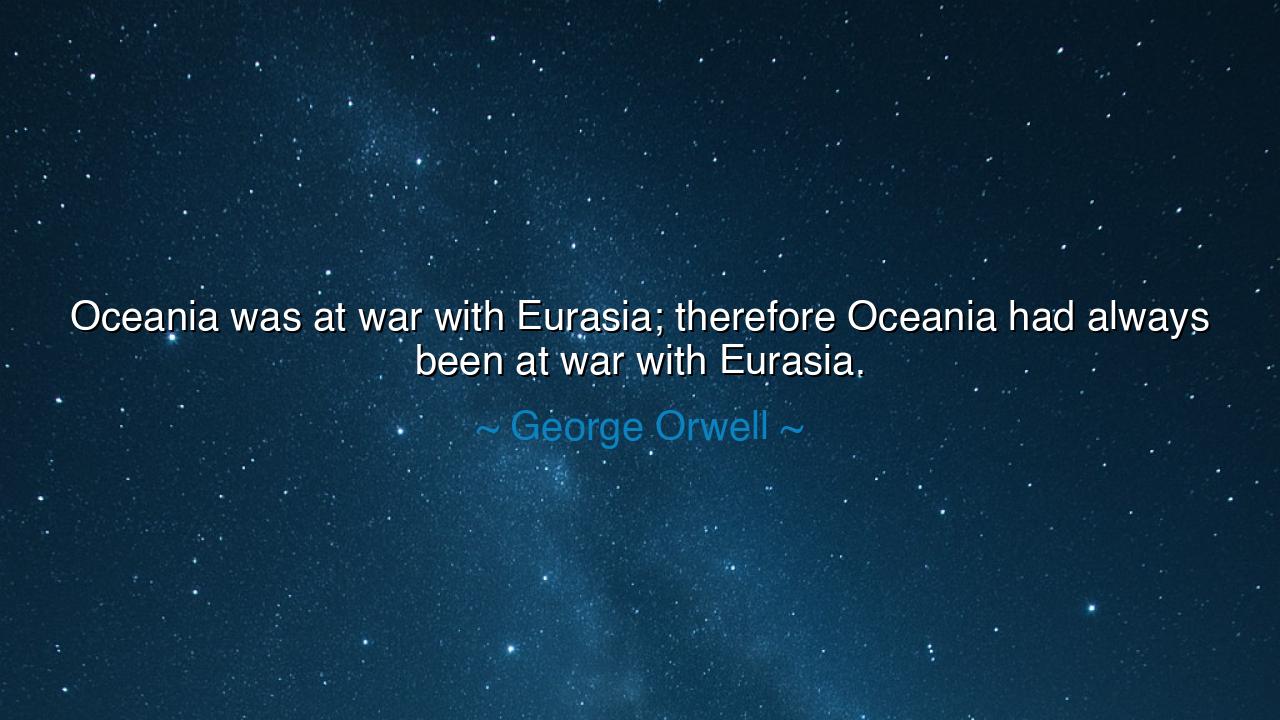
Oceania was at war with Eurasia; therefore Oceania had always
Oceania was at war with Eurasia; therefore Oceania had always been at war with Eurasia.






The prophet of modern tyranny, George Orwell, wrote in his immortal work 1984: “Oceania was at war with Eurasia; therefore Oceania had always been at war with Eurasia.” In these words, he unveiled the machinery of deceit by which rulers enslave minds. This is not merely the description of a fictional regime—it is a revelation of how power twists memory, how truth itself can be broken and reshaped, until men accept falsehood as reality.
The origin of this saying lies in Orwell’s vision of totalitarianism. In 1984, history is not a record but a weapon. The Party controls the past by rewriting it, and the people are commanded to believe today’s version as though it had always been so. Yesterday, the enemy might have been Eastasia; today it is Eurasia; tomorrow it will change again. Yet with each shift, the citizens are told: “We have always been at war with them.” To doubt this is treason, to remember differently is thoughtcrime. Thus Orwell showed that the most terrifying weapon is not the bomb, but the destruction of memory.
History offers chilling echoes of this. In the Soviet Union under Stalin, photographs were altered to erase those who had fallen out of favor; textbooks rewrote the past to make the leader infallible. Former allies became eternal enemies overnight, and the people were compelled to accept the new truth as though it had always been true. What Orwell captured in fiction was lived by millions: the reshaping of the past to serve the present.
But the lesson extends beyond dictatorships. In every age, rulers and factions are tempted to rewrite history, to present their cause as eternal and their enemies as perpetual. Consider the wars of the twentieth century, where propaganda told citizens that the nation had always stood for freedom, even when its past was stained with oppression. Or recall colonial powers that recast their conquests as missions of civilization, erasing the blood that stained their path. Here too, the cry of “we have always been at war” echoes, reminding us how easily truth bends before the altar of power.
The deeper meaning of Orwell’s line is that control of the past is the ultimate control of the present. If a people can be made to believe that what was once false is now true—and that it was always true—then they lose the very anchor of reality. Without memory, there is no truth; without truth, there is no freedom. A society that accepts such lies becomes clay in the hands of its rulers, molded into whatever shape serves their dominion.
For us who live today, the warning is urgent. Do not surrender your memory. Question what you are told about history. Guard against the rewriting of the past to suit the needs of the present. For the chains of tyranny are not forged first in the body, but in the mind. Once a people believe that “Oceania has always been at war with Eurasia,” they will believe anything—and in that moment, they are no longer free.
Therefore, let this wisdom endure: truth must be defended not only in the present but in the memory of the past. Teach your children history honestly, even when it is painful. Resist those who seek to whitewash crimes or exalt false heroes. For freedom is not secured by weapons alone, but by the courage to remember rightly. And as Orwell warned, when the past is destroyed, the future is enslaved.






WWuynh
Orwell’s chilling assertion here speaks to the ability of totalitarian states to manipulate truth. By constantly redefining history, the regime keeps its citizens in a state of confusion, unable to trust their own memory or the past. This made me wonder: how often do we see something similar in our society today? Is the war against reality happening in more subtle, yet equally effective, ways through media and political rhetoric?
DHNguyen Dang Hoang
Reading this, I’m struck by Orwell’s critique of how war and propaganda can shape a nation’s identity. The idea that Oceania ‘has always been’ at war with Eurasia shows how powerful language and narrative can be in constructing truth. Can we trust what we’re told by authority figures when history can be so easily rewritten? How often do we accept things as truth because it’s what we’re told, without questioning its consistency?
TPLe Thanh Phuong
The quote from *1984* gives me a sense of unease because it shows how a constant state of war can be used as a tool for control. By constantly telling people they’ve always been at war with someone, the regime keeps them distracted and unified against an external enemy, while manipulating their perception of reality. Are we, in some ways, manipulated by our own governments or media in similar ways today, making us question reality?
BNDong binh Nguyen
Orwell’s quote reminds me of how history can be distorted and weaponized by those in power. The idea that Oceania has ‘always been’ at war with Eurasia shows the terrifying impact of controlling public memory. In today’s world, how much can we trust the information we are given by governments and media? Are we experiencing a version of this ‘memory control’ in less extreme, but still concerning, ways?
HPHoang Pham
This quote feels chilling because it speaks to the power of propaganda and the malleability of truth in totalitarian regimes. Orwell suggests that by controlling the narrative, the government can make people believe whatever it wants, even if it contradicts previous facts. How much do we, in modern society, accept and internalize what we’re told without questioning the consistency of information? Is this happening in subtle ways today too?